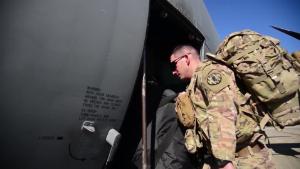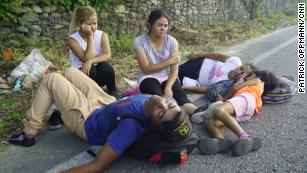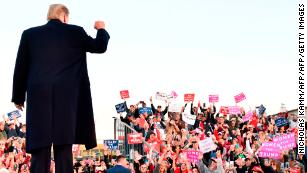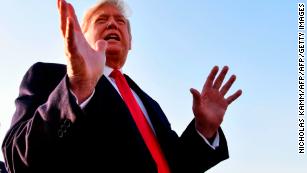Veterans slam Trump for border 'stunt'
With his decision to deploy more than 5,000 troops to the US-Mexico border, President Donald Trump has ordered more military personnel to the US southwest than he has serving in some of the world's most contentious combat zones.
Senior military officers have defended the deployment on national security grounds but the mission -- dubbed Operation Faithful Patriot -- raises a slew of questions, with many veterans condemning it as a political stunt by a President eager to fire up his political base just days away from the midterm elections.
"Donald Trump thinks unarmed people who are fleeing horrors and are still 1,000 miles away are a national security threat a week before election day?" said Will Fischer, a former Marine who now works for the VoteVets, a progressive veteran's organization.
"I don't think so," Fischer said. "It's a political ploy to blow upon the embers of racism and nativism, and he is using the military again as a political prop to advance his own agenda"
Pentagon to send 5,000 troops to border as migrants inch closer
Fischer and other veterans point to the unknown cost to taxpayers, given that much smaller deployments of National Guard to the border have cost hundreds of millions of dollars. They also question the cost the military will bear, as the operation pulls troops away from training, other missions and their families. And then, they say, there's the murky legality of the mission, its scope and its purpose.
Still, the Pentagon appears ready to move forward with the deployment and military officials said Tuesday that the number of troops is likely to exceed 5,200, a total that will surpass the number of US military personnel currently fighting what remains of ISIS in Iraq and Syria.
US troops will join over 2,000 National Guardsmen who are already at the border, meaning upwards of 7,000 American forces will be mobilized to stop Central American migrants that are still some 900 miles away from the border and weeks away from arriving in the US.
Currently, 5,239 troops are scheduled for deployment to the border but that number will likely grow, according to Gen. Terence O'Shaughnessy, the head of Northern Command, who said that the Pentagon does not yet know how many more forces might be added.
Asked if the military was being used as a political tool, O'Shaughnessy said Tuesday that "I firmly believe that border security is national security."
"This caravan is different from what we've seen in the past," he said, referring to the migrant group making its way north to seek asylum and arguing that its size -- approximately 3,500 people as of now -- presented security challenges.
A detachment of US Marines will also participate in the border security operation, according to two defense officials. Planning is still underway as to the exact make-up of the Marine detachment, but it will consist of engineers and offer support to Customs and Border Patrol.
Another US defense official told CNN on Tuesday that there are approximately 2,000 additional US troops that have been identified as a reserve force and could be sent to the border should the need arise.
Political ploy?
Despite Trump's unsubstantiated claim that the group of Central Americans includes "gang members and some very bad people," most of the migrants have reportedly indicated that they plan to apply for asylum once they arrive in the US.
"This is not a national security issue. ... We're seeing women, children and the elderly within this caravan fighting for their lives. We don't need more military there," according to Bishop Garrison, the interim executive director of the Truman National Security Project, a left-leaning organization focused on national security and veterans issues.
"We don't need to make a sensitive issue and situation all the more dramatic," said Garrison, a former Homeland Security and Pentagon official.
Trump's immigration moves are 'dangerous' political stunts, advocates say
Both Fischer and a former military official, interviewed separately, raised the question of the rules of engagement for the troops. The former official, who worked at Central Command while Defense Secretary James Mattis was commander, asked, "what if something does happen and lethal force is deployed and you have the US military firing at unarmed civilians?"
"There are laws, there are regulations about how the military can and should be used," the official said. "As somebody that deployed and said good bye to my wife and kids multiple times, you want to be confident about the mission. Sending military troops to the border to defend against unarmed civilians is just nonsense."
Anger about the deployment and the perception that Mattis is allowing the military to be used for political purposes led one former Pentagon official to call for him to step down.
"This is a craven political stunt by President Trump ahead of the US midterms, and a cynical capitulation by a secretary of defense who has prided himself on improving the readiness, focus and lethality of the US armed forces," Kelly Magsamen, a National Security Council official under both President George W. Bush and President Barack Obama, wrote in Defense One.
"If Mattis does not believe the migrants are a threat that warrants tasking 5,000 active troops to the border, he should say so and resign," Magsamen wrote.
Cost and readiness concerns
Fischer touched on concerns about troop readiness, saying that once these troops are at the border, "they're not going to be training, they're not going to be preparing for the fights that could be on the horizon from legitimate threats."
Instead, Fischer said, these troops will be tasked with supporting border officials in a way that means "we're going to spend a tremendous amount of money and a tremendous amount of resources to have these troops act as errand runners, act as go-fers, act as camouflage-wearing Uber drivers for [homeland security] and border patrol personnel."
"This is taking away from mission readiness and this is Donald Trump playing politics with our national security," Fischer said.
Donald Trump's closing campaign message: Be afraid
The former military officer, who logged two decades of experience as an army officer before moving on to become a strategist, said the troops were being sent to "do a mission that could ... be done by another entity" such as the National Guard.
Dave McGinnis, a former Acting Assistant Secretary of Defense, agreed.
"The big problem that I and many former and active military guys have with this thing is that the Posse Comitatus [law] forbids the army from enforcing domestic laws unless there's no other choice and Trump has lots of choices," McGinnis said.
The President could use federal law enforcement officers such as the US Marshals, or the Army and National Guard. There's also Immigration and Customs Enforcement, McGinnis notes. "We already have an organization that enforces that civil law. It's called ICE."
In 2010, President Obama sent 1,200 National Guard troops to boost security at the border but those levels pale in comparison to number of active duty troops being sent by Trump.
Defenders of this deployment argue Trump is making a sensible short-term decision.
"The President and the administration wants to look like they are acting decisively ... they want to appear strong. ... The military is a quick way to respond to things in many cases," Tom Spoehr, director of the Heritage Foundation's Center for National Defense and a US Army veteran said.
But Spoehr noted that while the military could provide a fast, effective response option, in his view, the President should not lean on those troops for more than two or three months.
The former official pointed out that US laws prohibit the military from detaining people, "so it's not like we're sending down an operational force, it's just people in a largely supportive role. That's why I say it's a stunt, so [Trump] can say, yeah, we're sending the military down to the border."
McGinnis said Trump's move also sets a precedent. "If Congress allows him to do this, you're pushing the envelope on using the military for things this country has never, ever permitted," he said.
"The visual on this for the world is really bad from a military perspective," McGinnis said. "It's using regular military troops for things that democracies really don't do."
Cost also remains a major concern. Congressional sources with the House and Senate Armed Services Committees told CNN that they have not received cost data from the Pentagon.
And while Pentagon spokesperson Christopher Sherwood told CNN Tuesday that details related to the final price tag are still being worked out, immigration critics maintain that sending troops to the border to respond to families fleeing violence is fundamentally a waste of money.
"It's not fair to troops," said Garrison of the Truman National Security Project. "This is going to be very costly and just flat-out wrong," he said, arguing that it doesn't make sense to send the military to handle this humanitarian crisis.
News Courtesy: www.cnn.com














